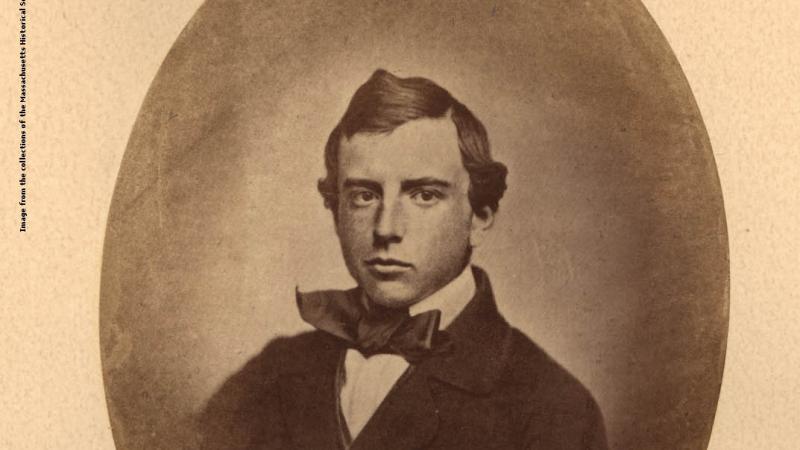
An unknown photographer took this photograph of Henry Adams in 1858, the year that Adams graduated from Harvard University.
from The Education of Henry Adams (1907?)
*****
The atmosphere of education in which he lived was colonial, revolutionary, almost Cromwellian, as though he were steeped, from his greatest grandmother&rsquos birth, in the odor of political crime. Resistance to something was the law of New England nature; the boy looked out on the world with the instinct of resistance; for numberless generations his predecessors had viewed the world chiefly as a thing to be reformed, filled with evil forces to be abolished, and they saw no reason to suppose that they had wholly succeeded in the abolition; the duty was unchanged. That duty implied not only resistance to evil, but hatred of it. Boys naturally look on all force as an enemy, and generally find it so, but the New Englander, whether boy or man, in his long struggle with a stingy or hostile universe, had learned also to love the pleasure of hating; his joys were few.
*****
Harvard College, as far as it educated at all, was a mild and liberal school, which sent young men into the world with all they needed to make respectable citizens, and something of what they wanted to make useful ones. Leaders of men it never tried to make. Its ideals were altogether different. The Unitarian clergy had given to the College a character of moderation, balance, judgment, restraint, what the French called mesure; excellent traits, which the College attained with singular success, so that its graduates could commonly be recognized by the stamp, but such a type of character rarely lent itself to autobiography. In effect, the school created a type but not a will. Four years of Harvard College, if successful, resulted in an autobiographical blank, a mind on which only a water-mark had been stamped.
The stamp, as such things went, was a good one. The chief wonder of education is that it does not ruin everybody concerned in it, teachers and taught. Sometimes in after life, Adams debated whether in fact it had not ruined him and most of his companions, but, disappointment apart, Harvard College was probably less hurtful than any other university then in existence. It taught little, and that little ill, but it left the mind open, free from bias, ignorant of facts, but docile. The graduate had few strong prejudices. He knew little, but his mind remained supple, ready to receive knowledge.
What caused the boy most disappointment was the little he got from his mates. Speaking exactly, he got less than nothing, a result common enough in education. Yet the College Catalogue for the years 1854 to 1861 shows a list of names rather distinguished in their time. Alexander Agassiz and Phillips Brooks led it; H. H. Richardson and O. W. Holmes helped to close it. As a rule the most promising of all die early, and never get their names into a Dictionary of Contemporaries, which seems to be the only popular standard of success. Many died in the war. Adams knew them all, more or less; he felt as much regard, and quite as much respect for them then, as he did after they won great names and were objects of a vastly wider respect; but, as help towards education, he got nothing whatever from them or they from him until long after they had left college. Possibly the fault was his, but one would like to know how many others shared it. Accident counts for much in companionship as in marriage. Life offers perhaps only a score of possible companions, and it is mere chance whether they meet as early as school or college, but it is more than a chance that boys brought up together under like conditions have nothing to give each other. The Class of 1858, to which Henry Adams belonged, was a typical collection of young New Englanders, quietly penetrating and aggressively commonplace; free from meannesses, jealousies, intrigues, enthusiasms, and passions; not exceptionally quick; not consciously skeptical; singularly indifferent to display, artifice, florid expression, but not hostile to it when it amused them; distrustful of themselves, but little disposed to trust any one else; with not much humor of their own, but full of readiness to enjoy the humor of others; negative to a degree that in the long run became positive and triumphant. Not harsh in manners or judgment, rather liberal and open-minded, they were still as a body the most formidable critics one would care to meet, in a long life exposed to criticism. They never flattered, seldom praised; free from vanity, they were not intolerant of it; but they were objectiveness itself; their attitude was a law of nature; their judgment beyond appeal, not an act either of intellect or emotion or of will, but a sort of gravitation.